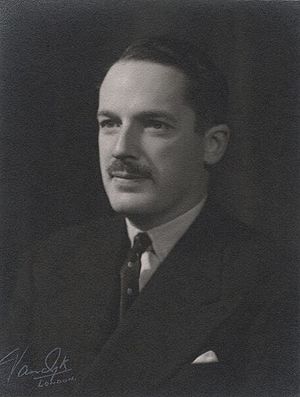Reginald Dorman-Smith facts for kids
Sir Reginald Hugh Dorman-Smith (born March 10, 1899 – died March 20, 1977) was an important figure in the British Empire. He was a soldier, a politician, and a diplomat. He worked to help farmers and later became a governor in Burma.
Contents
Early Life and His Work for Farmers
Reginald Dorman-Smith went to Harrow School and then to the Royal Military College to train as a soldier. After serving in the army, he became very interested in farming.
Leading Farmers and Becoming a Minister
At just 32 years old, he became the president of the National Farmers Union (NFU). This group helps farmers in the UK. Later, he became the Minister of Agriculture. This meant he was in charge of farming and food for the country.
In 1935, he was elected as a Member of Parliament (MP) for Petersfield. This meant he represented the people of that area in the government.
Helping Britain Grow Food
In 1939, Prime Minister Neville Chamberlain made Dorman-Smith the Minister of Agriculture. In 1940, he started the "Dig for Victory" campaign. This campaign encouraged people to grow their own food in gardens and allotments. It helped make sure Britain had enough food during World War II. When a new prime minister, Winston Churchill, took over, Dorman-Smith was not part of the new government.
Governor of Burma
Dorman-Smith became the Governor of Burma in 1941. Burma was a country in Asia that was part of the British Empire. He was governor when Japan invaded Burma during World War II. The Japanese forced him to leave the country.
Years in Exile
From 1942 to 1945, he lived in Simla, India, which was also part of the British Empire. In 1943, he gave a speech in London. He said that Britain had talked a lot about giving countries like Burma more self-government. However, he felt they had not done enough. He believed this had made people in Asia lose trust in Britain. He said that Britain needed a new and better approach after the war.
Returning to Burma
After the war, Dorman-Smith returned as governor in 1946. However, he soon left Burma for health reasons. While he was away, Major-General Sir Hubert Rance took over. Rance, with support from Lord Mountbatten, pushed for Burma to become independent very quickly.
Simla Conference 1944
In 1944, while in exile, Sir Reginald Dorman-Smith met with leaders of the Anglo-Burmese community in Simla. This meeting was called the Simla Conference. They talked about the future of the Anglo-Burmese people after the war.
Who Attended the Conference?
The Anglo-Burmese delegates who attended included:
- Mr. G. Kirkham
- Mr. H.J. Mitchell B.Fr.S.
- Mr. J. Barrington I.C.S.
- Mr. K.W. Foster B.C.S.
- Mr. E.A. Franklin I.C.S
- Mr. W.A. Gibson
- Mrs. K. Russell
- Mr. H. Elliott
- Mr. C.H. Campagnac
- Mr. J.A. Wiseham
- Mr. J.F. Blake
Results of the Conference
One important result of the conference was an promise to the Anglo-Burmese community. They were told they could keep their freedom to worship their religion. They could also continue their own customs and use the English language.
Even after leaving Burma, Dorman-Smith remained interested in its future. He believed that if he had been allowed to stay, he could have helped Burma remain part of the British Commonwealth.
His Family
Reginald Dorman-Smith was born at Bellamont House in Cootehill, County Cavan, Ireland. His father was Protestant and his mother was Catholic. He had two brothers who also had interesting careers.
His Brothers
One brother, Eric Dorman-Smith, was a major-general in the British Army during World War II. His other brother, Victor Dorman-Smith, was a Royal Navy captain. He worked in Combined Operations during World War One.
Reginald Dorman-Smith's daughter, Patricia, married the writer Gwyn Griffin in 1950.
 | Aaron Henry |
 | T. R. M. Howard |
 | Jesse Jackson |


